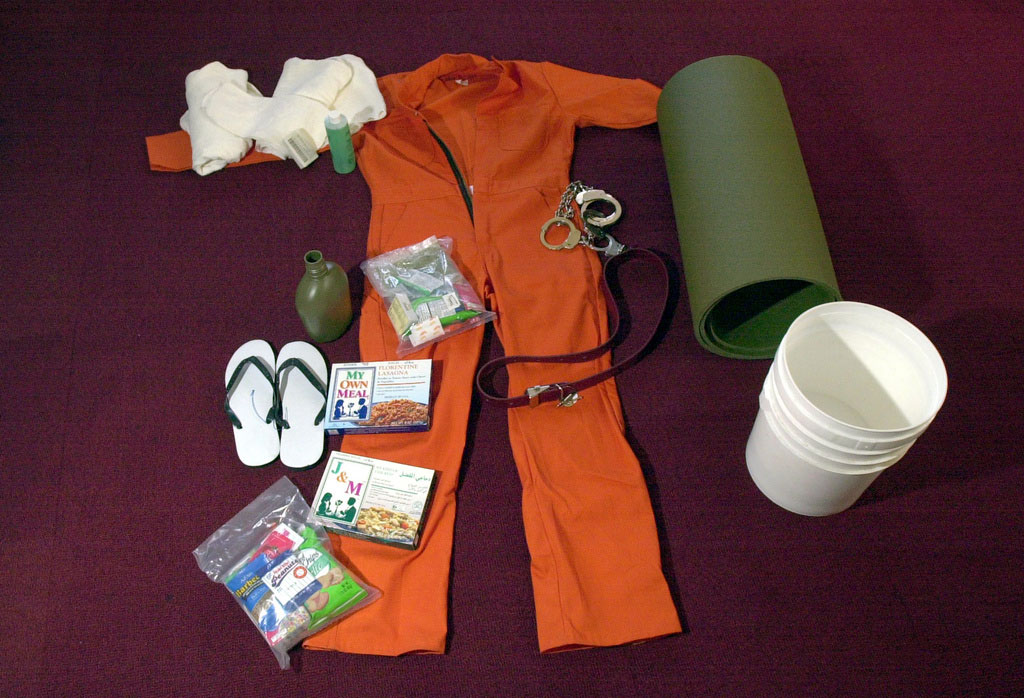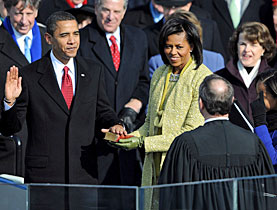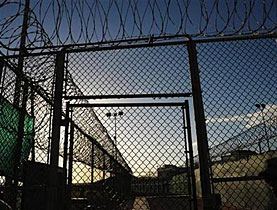Swiss to accept one Guantánamo detainee

The Swiss government has said it will take one detainee from the United States detention facility at Guantánamo Bay, Cuba.
The government, which at one point had looked at accepting three prisoners, said it would allow the Uzbek national to live in Switzerland for “humanitarian reasons”. Canton Geneva has said it is prepared to accept the man.
The terms of acceptance are governed by a Memorandum of Understanding that was negotiated with the United States and is ready for signature.
European nations that have agreed to accept detainees in recent months include France, Hungary, Ireland, Italy and Portugal.
US President Barack Obama ordered the facility to be closed by January 2010, but said last month the deadline would be missed. There are currently 215 detainees at Guantánamo.
At a media conference in Bern on Wednesday, Justice Minister Eveline Widmer-Schlumpf said Switzerland had repeatedly criticised holding prisoners in the camp as unconstitutional.
“With this decision, we want our humanitarian tradition to contribute to a solution,” she said. “We don’t want to just criticise.”
Reaction
Human rights organisation Amnesty International welcomed the news.
“We’re very happy, because it’s something we’ve been striving for for many years,” Manon Schick from Amnesty’s Swiss section told swissinfo.ch. “It’s taken a long time to clear all the issues with the authorities in the US, but now they’re ready, so it’s very good.”
The centre-left Social Democratic Party said it was a “sign of openness and solidarity to the world”.
The centre-right Christian Democratic Party expected the US to show its gratitude and in future hold back when criticising the sovereignty of other countries.
The only main political party to criticise the decision was the rightwing Swiss People’s Party, responsible for a national vote two weeks ago that banned the construction of minarets in Switzerland.
The People’s Party said it fundamentally opposed taking any Guantánamo detainees. The US had to clean up its own mess, it said, adding that were Switzerland to take any detainees, the Swiss government should explain what the US was going to do in return.
The US embassy in Bern told swissinfo.ch in a statement: “We are grateful to the government of Switzerland for its willingness to join our effort to close Guantánamo by agreeing to resettle a detainee from Guantánamo Bay. The United States will continue to work closely with Switzerland regarding this matter.”
“No danger”
The US’s original accusation that the man had links with terrorist groups has never been proven, according to a Swiss government statement on Wednesday. As long ago as 2005, the imprisoned Uzbek was classified by the US as “cleared for release”.
The Swiss government sent a delegation to Guantánamo last August which spoke at length with the detainee and had him examined by a Swiss doctor.
The US authorities have assured Switzerland that the man has been neither prosecuted nor convicted, and that he constitutes no danger to public safety.
After discussions with the Swiss delegation, the Uzbek submitted a written application for transfer to Switzerland. He confirmed that he had not been involved in terrorist activity in the past and that he would not participate in any illegal activities in the future.
He further undertook to respect Swiss law, to learn French and to find work. He will live in canton Geneva, which accepted a request from the government.
Initial rejection
Amnesty doesn’t think the number of ex-Guantánamo detainees in Switzerland will remain at one.
In November 2008 the Swiss Migration Office turned down asylum requests from three Guantánamo inmates: a Libyan, an Algerian and a Chinese.
They made their asylum applications when US authorities signalled they were free to leave after seven years imprisonment if they found a safe haven.
Amnesty International is supporting an appeal against this decision that is being made to the Federal Administrative Court.
In December the US made an official request to Switzerland to accept inmates who were being released for lack of charges. On that occasion the government undertook to examine the request “extremely closely”.
However, Widmer-Schlumpf said in a newspaper interview in January that “the United States created Guantánamo and therefore they must solve the problem”. But she did not rule out Switzerland joining in a European solution.
End in sight?
Human rights organisations have accused the US of holding inmates for years without charges and many prisoners have complained of abuse. Most of the 600 people who have so far been released had not been tried. Their release came because investigators determined that they did not pose a risk to the US.
On Tuesday President Obama ordered the government to acquire an underused state prison, Thomson Correctional Center, in rural Illinois to be the new home for a limited number of terror suspects now held at Guantánamo.
The decision is a significant step toward closing Guantánamo, but it will not solve all the administration’s Guantánamo-related problems. There still will be dozens of detainees who are not relocated to Thomson, other legal issues and potential resistance from Congress.
Thomas Stephens, swissinfo.ch
The first prisoners were transferred to the detention camp in Guantánamo Bay in Cuba on January 11, 2002.
The US government designated them “enemy combatants”, and declared that they were not covered by the Geneva Conventions which safeguard the rights of prisoners of war.
At its highest point the prison population reached 800.
There are currently 215 left.
Many detainees were eventually ruled not to have links with terrorist groups, but fear arrest and torture if they returned to their own countries.
This is why third country solutions need to be found for them.
US President Barack Obama long criticised the interrogation practices used, saying they amounted to torture.

In compliance with the JTI standards
More: SWI swissinfo.ch certified by the Journalism Trust Initiative




You can find an overview of ongoing debates with our journalists here. Please join us!
If you want to start a conversation about a topic raised in this article or want to report factual errors, email us at english@swissinfo.ch.